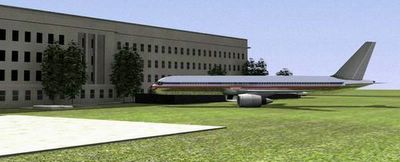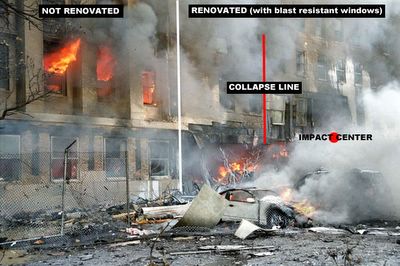Apart from what I posted on yesterday and the day before, there is at least one other strange thing about Sweeney's call-- she clearly says passengers were stabbed before the hijackers entered the cockpit.
If we assume this is true, then there should have screaming or alarms set off-- why on earth wouldn't the pilots have been alerted that there were hijackers and secured the door? Or at least they could have alerted ground control of the commotion. But that didn't happen.
The only way that this would make sense from the official story is that one hijacker snuck up to the cockpit, perhaps with a (fake?) bomb, got in the door, and then made threats to the pilots to make them go to NYC. If the hijacker had a gun, this scenario might be more believable, and there was of course the FAA report of a passenger being shot on flight 11, but then this report was officially called an error (a strange error, but that sort of thing is typical for 9/11).
If one hijacker got into the cockpit, the other hijackers may have been creating a diversion in the main cabin at this time or may have been preventing flight attendents from going near the cockpit (
in her call at 8:19am, Betty Ong says the hijackers sprayed gas in the first class cabin-- so how did the hijackers put up with the gas until 8:38am? Did they have gas masks? That seems unlikely. The other problem of course is that Sweeney never says anything about gas being sprayed by the hijackers.). In any case, according to Sweeney, only much later in the flight did the hijakcers go into the cockpit and kill the pilot-- presumably the hijacker pilot took over then, and this fits with Sweeney describing a sudden change in course after they went in (oddly, she doesn't report a change in course before this, though Ong reports the plane flying erratically at 8:26am). This initial single hijacker scenario could also explain why Sweeney only described four hijackers when there were supposed to be five on the flight.
The main thing wrong with this scenario is that initially you have only a single hijacker entering the cockpit and making demands against two pilots. How likely is it that this would be feasible unless the hijacker had a gun. If the hijacker had a bomb of some sort, it seems like one of the pilots could have overpowered him. At least one of the pilots could have alerted ground control to the hijacker or at least pressed the hijack code in the transponder if there was only one hijacker to deal with. But this never happened. Also are we to believe that this single hijacker was able to get the pilot to turn off the transponder (this happened no later than 8:20am and Sweeney doesn't describe the other hijackers going in until after 8:38am)? How would the hijacker even know if was off? Couldn't the pilot punch in the hijack code and say that he turned it off? Why was the transponder even turned off anyway?
While this single hijacker scenario is theoretically possible, the problem with Sweeney's call is that it completely diverges from what Betty Ong says about the hijacking-- most suspiciously the lack of mention about the hijackers using gas or pepper spray, but also about the sequence of the hijacking. Ong says the plane was flying erratically at 8:26am, long before Sweeney says the other hijackers entered the cockpit. Why would the plane be flying erratically unless the hijacker pilot was flying or there was a struggle in the cockpit? But how could a single hijacker gain access to the controls over two pilots or win a struggle with two pilots? It simply doesn't make sense. Thus, it almost seems as if Sweeney's call is coming from another hijacked plane than from the hijacked plane where Ong's call take place. There is no record that Sweeney or Ong ever acknowledge each other in their calls, despite the fact that they both are ID'ing hijackers and trying to reach the cockpit.
Thus I think either:
1) Sweeney and Ong were on different hijacked planes,
2) one of the two calls was a fake,
or
3) there was a fake hijacking "drill" on flight 11 and Sweeney and Ong were told to make up some details about the "hijacking, which is why their stories diverge signficantly.
In fact, early on when I started this blog, over six months ago now, I speculated that Sweeney and Ong were on two different planes. And in fact, the 9/11 researcher Woody Box has done research to suggest that there actually were two flight 11's. That possibility still seems very much alive.
Another possibility, not exclusive of what is listed above, is that the plane was taken over by remote control before the hijackers got into the cockpit.
Another oddity I just noticed:
in the 9/11 Commission Report, they write that Sweeney says there is a bomb in the cockpit. How would she know this if she can't communicate with the cockpit as she says? Certainly she didn't see the supposed initial hijacker go in and therefore couldn't see he had a bomb. So why would she think there was a bomb in the cockpit? If a passenger saw a hijacker go into the cockpit with a bomb, and told this to Sweeney, why wouldn't Sweeney pass along this vital information? Why would Sweeney just say there was a bomb in the cockpit? It may have been merely a rumor started by the passengers or a detail she made up as part of the "hijack drill".
The bottom line is that there are several major questions about the Sweeney call:
1) why didn't she say anything about an initial hijacker getting in the cockpit?
2) why didn't she say anything about the hijackers using gas?
3) why did she only talk about a change in course after several hijackers gained entry into the cockpit?
4) why didn't Sweeney know the right seat numbers for the hijackers (Ong apparently had the right numbers)?
5) why was she unable to recognize Manhattan or unwilling to say anything specifically about Manhattan? (Sorry, but the "I see buildings and water" remark sounds fake).
6) what exactly made Sweeney say "oh my god"? Looking out the side of the plane, she wouldn't be able to see that they were about to hit anything.
Again, all this is rather suspicious.




